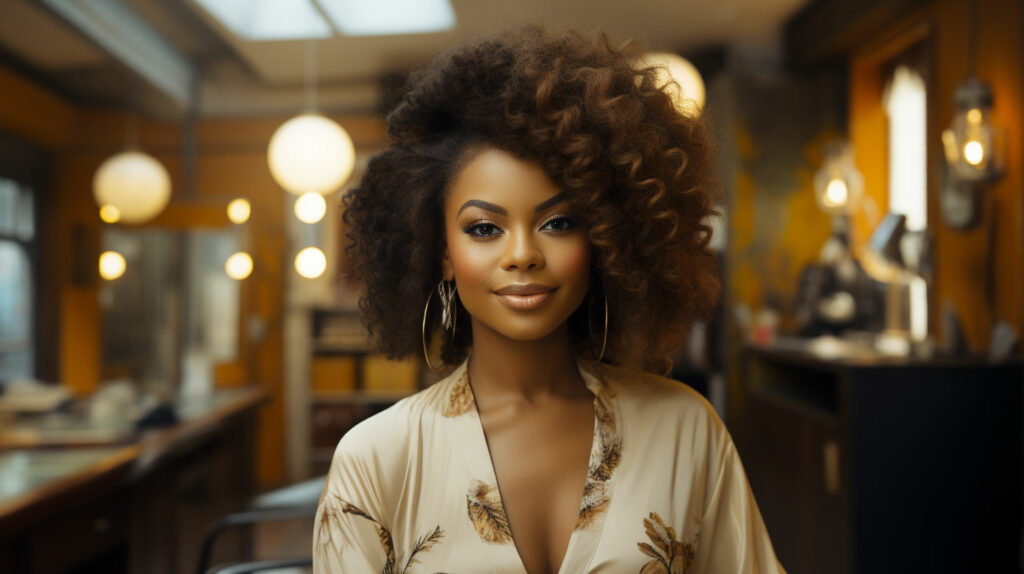Ever dreamt of creating your own clothing brand, one that resonates with black history and culture? It’s a journey that demands more than just a creative mind. Understanding the fashion industry landscape is crucial, as is carving out a unique brand identity.
Strategies for Launching Successful Black-Owned Brands
Creating a successful black-owned clothing brand involves crafting an effective marketing plan, using social media influencers, implementing sustainable practices, and focusing on customer service. Let’s dive deep into each of these strategies.
Craft an Effective Marketing Plan
The first step in creating your black-owned clothing brand is to craft a killer marketing plan. You need to know who you’re targeting and what they want. This means understanding their age, location, interests, and more.
For example, if you’re targeting young adults who are into streetwear fashion, your marketing should reflect that style. Use cool graphics and edgy designs in your promotional materials.
Don’t forget to collaborate with other businesses too! Teamwork makes the dream work after all!
Utilize Social Media Influencers
Nowadays everyone’s on social media. And there are people out there known as influencers who have tons of followers that listen to their every word (or rather read every post).
Getting these influencers to wear your clothes can be a great way to get the word out about your brand. Just make sure you choose influencers who align with your target audience and brand image.
Remember though: this isn’t just a one-way street. You’ve got to give something back – whether it’s free clothes or payment.
Implement Sustainable Practices
Sustainability is the buzzword nowadays. More and more consumers are becoming conscious about where their clothes come from and how they’re made.
Implementing sustainable practices in your business not only helps the planet but also attracts these conscious consumers. This could be anything from using organic cotton to recycling old clothes.
However, don’t just do it for show – make sure it’s part of your brand ethos!
Focus on Customer Service Quality
Last but definitely not least: focus on customer service quality! No matter how good your clothes are or how creative your marketing is – if customers aren’t happy, they won’t come back.
Good customer service can go a long way in building a positive brand reputation. Always be prompt in responding to queries and handle complaints with grace.
Remember: a happy customer is a repeat customer!
Profiling Notable Black-Owned Brands Across Cities
Let’s dive into the ocean of successful black-owned brands. From New York to Johannesburg, they’re making waves and setting trends.
Successful Black-Owned Brands Globally
In New York City, you’ll find Pyer Moss, a brand that merges fashion with social activism. The founder, Kerby Jean-Raymond, uses his collections to address racial inequality.
Down South in Nigeria, Orange Culture is shaking up the fashion scene. Adebayo Oke-Lawal started it as a movement against toxic masculinity. His designs are bold and expressive. Site: orangeculture.com.ng
Across continents in Los Angeles, Union LA stands tall. Chris Gibbs owns this streetwear shop that sells high-end brands like Off-White and Fear of God. Site: unionlosangeles.com
And then there’s No Vacancy Inn from Brooklyn. It’s an art collective and clothing line owned by Tremaine Emory and Acyde Odunlami who use their platform to discuss race and identity. Site: novacancyinn.com
These brands have different price points but one common goal – representing the black community authentically.
Unique Selling Propositions And Growth Strategies
Orange Culture’s USP lies in challenging societal norms through fashion. Their growth strategy involves partnering with international stockists to reach global audiences.
Union LA’s USP is its curated selection of high-end streetwear brands while No Vacancy Inn uses art as a platform for dialogue about race as their USP.
Overcoming Challenges Towards Success
The journey wasn’t always smooth sailing for these brands. They faced financial constraints, market acceptance issues due to their unconventional styles, and even racial discrimination.
But they didn’t let these challenges stop them. They pushed forward with determination and resilience – qualities that are now synonymous with their success stories!
The Impact of Black-Owned Brands in Fashion
Influence on Global Fashion Trends
Black-owned clothing brands are shaking up the fashion world. They’re not just following trends, they’re setting them. Take streetwear, for example. It’s been heavily influenced by black culture and style.
Brands like Denim Tears and Off-White have left their mark on this trend. Their unique designs are seen on streets worldwide.
Representation and Diversity in the Industry
Black-owned labels are bringing much-needed diversity to fashion. For too long, the industry lacked representation from different cultures and backgrounds.
Now, these brands are changing that narrative. They offer a fresh perspective and create clothes that reflect their cultural heritage.
Economic Empowerment within Black Communities
Starting a fashion brand can be a powerful way to boost the economy in black communities. These businesses create jobs and opportunities for local people.
Take FUBU as an example – it started small but grew into a global brand with hundreds of employees.
Plus, when you support black-owned businesses, you keep money within these communities which helps them thrive.
Driving Social Change through Fashion
Fashion isn’t just about looking good; it can also send powerful messages about social issues. Many black-owned brands use their platform to drive change.
Step-by-Step Guide to Launching Your Own Black-Owned Clothing Brand
Step 1: Identify Your Niche
Your first step should be to identify your niche in the fashion industry. This could be anything from streetwear to high-end fashion, or even a mix of both. Your niche should reflect your personal style and the audience you aim to cater to.
Step 2: Create a Business Plan
A solid business plan is crucial for any business venture. This should outline your business goals, target audience, marketing strategy, and financial projections. This will not only guide your business operations but also attract potential investors.
Step 3: Register Your Business
Register your business to make it official. Legal and domain name. This process will vary depending on your location, but it generally involves registering your business name, obtaining a tax ID, and acquiring necessary permits and licenses. If you’re having trouble picking a name for your black owned clothing brand, don’t worry! There’s a tool called Namelix that can really help you out.
Step 4: Design Your Brand
Your brand is more than just your logo. It encompasses your business name, color scheme, and overall aesthetic. Your brand should be unique and appealing to your target audience. Adobe has a free logo maker tool available, providing templates and necessary files for you to start designing your logo.
Step 5: Source Materials and Manufacturers
Find reliable suppliers and manufacturers who can provide high-quality materials and produce your designs. It’s important to ensure that they follow ethical labor practices. Dropshipping could be a simple way to try out different products and see what sells, using platforms like Printify, Subliminator and Inked Joy to source products and manufacturers.
Step 6: Create Your First Collection
Design your first collection. Start small, focusing on a few key pieces that represent your brand’s style and aesthetic. To help you out with catalogue photos, you can use services like PlaceIt and generate mockups.
Step 7: Market Your Brand
Use social media, fashion shows, and collaborations with influencers to get your brand out there. Consider hiring a professional photographer to capture high-quality images of your clothing for your website and promotional materials.
Step 8: Launch Your Brand
Once you have a collection and a marketing strategy, it’s time to launch your brand. This could involve hosting a launch party, opening a pop-up shop, or starting online sales.
Step 9: Provide Excellent Customer Service
Always prioritize your customers. Respond to inquiries promptly, handle returns and exchanges professionally, and go the extra mile to ensure customer satisfaction.
Tips for domain name for Black Owned Clothing Brand
Domain names are vital in the digital world. They are like your brand’s address on the internet.
Why a Catchy Domain Name Matters
Your domain name is like your shop’s signboard. It needs to be catchy and memorable. Think about it, would you rather visit “www.fashion4u.com” or “www.zigzagzogclothes.com”? The first one sticks in your mind, right?
- It’s simple
- Easy to remember
- Directly relates to what you’re selling
That’s the power of a catchy domain name!
Mixing Cultural References and Personal Values
Let’s add some flavor to our domain name! How about infusing it with cultural references or personal values? Say, we’re talking about black-owned clothing brands here.
Why not use words that resonate with African heritage? Or maybe incorporate values that matter to you as an entrepreneur?
Checking Domain Availability and Registration Process
Before settling on a domain name, check if it’s available. You don’t want all that brainstorming going down the drain because someone else already owns your chosen domain.
Here’s how:
- Visit any domain registration site (like GoDaddy or Namecheap)
- Type in your desired domain name
- If it shows ‘available’, congratulations! If not, try tweaking it or choose another
After finding an available one, register it ASAP! Don’t let anyone beat you to it.
SEO-Friendly Domain Names
Lastly, let’s talk SEO (Search Engine Optimization). Ever wondered how some websites always pop up at the top when you Google something? That’s SEO magic!
An SEO-friendly domain name can boost your website’s visibility. It helps search engines understand what your site is about.
For instance, if you’re selling African-inspired clothes, a domain like “africanfashionhub.com” could work wonders. It clearly tells search engines (and users) that you’re all about African fashion.
Best Platform for Black Owned Online Clothing Store
Choosing the right platform to launch your black-owned clothing brand is crucial. It’s about weighing up different factors like user interface, fees, customer support, mobile optimization, and social media integration.
Comparing E-Commerce Platforms
There are a bunch of e-commerce platforms out there. Some popular ones include Shopify and Etsy. Some people would recommend WordPress with Woocommerce, but if you do not have technical knowledge and web development experience, I would not recommend to use WordPress.
- Shopify is super user-friendly with its drag-and-drop interface. But it does charge transaction fees unless you use their payment gateway.
- Etsy on the other hand doesn’t charge transaction fees but listing products cost a bit.
So, it’s all about what suits your budget and technical skills best.
User Interface Fees and Customer Support
When picking a platform, consider how easy it is to navigate. A complex user interface can be off-putting for some folks.
Also look at the costs involved:
- Transaction fees
- Listing fees
- Monthly subscription costs
Customer support is another biggie! You want top-notch service if things go haywire.
Mobile Optimization Matters
These days everyone’s shopping on their phones. So having a mobile-friendly online store is key.
If your site loads slow or looks wonky on mobile devices, customers could bounce faster than a basketball during the NBA finals!
Boost Sales with Social Media Integration
Social media isn’t just for cute cat videos anymore; it’s also a powerful sales tool for businesses like yours!
Platforms like Instagram and Facebook let you set up shop right within their apps. This makes buying your products as easy as liking a post!
Integrating social media into your online store can help boost sales big time! Plus, it gives you an extra way to connect with your customers.
WooCommerce vs. Shopify: A Comparative Analysis
WooCommerce and Shopify are two of the most popular e-commerce platforms available today. Both offer unique features and benefits, but they also have their own set of drawbacks. Here is a comparative analysis of both platforms.
WooCommerce Pros and Cons:
WooCommerce is a free, open-source plugin for WordPress, making it a cost-effective choice for small businesses. It provides complete control over your store, allowing you to customize every aspect of your website. WooCommerce also integrates well with many third-party tools and services.
However, WooCommerce is not as user-friendly as Shopify, especially for beginners. It requires a certain level of technical knowledge to set up and manage. Additionally, while the plugin itself is free, you may need to purchase additional plugins, themes, or hosting services to make your store fully functional.
Shopify Pros and Cons:
Shopify is a fully hosted platform that provides everything you need to set up and run an online store. It is incredibly user-friendly, making it an excellent choice for beginners. Shopify also offers 24/7 customer support, which can be invaluable for new businesses.
On the downside, Shopify is more expensive than WooCommerce. Its pricing plans start at $29 per month, and you may need to pay additional fees for certain features or third-party integrations. Shopify also lacks the customization options that WooCommerce offers.
New-Business-Friendliness:
When it comes to new-business-friendliness, both platforms have their strengths. WooCommerce is a more budget-friendly option, and its customization options can be a boon for businesses with specific needs. However, its technical requirements can be a barrier for those without web development experience.
On the other hand, Shopify is more beginner-friendly and provides comprehensive support. Its higher cost can be a drawback for new businesses, but the ease of use and convenience it offers can make it worth the investment.
In conclusion, the choice between WooCommerce and Shopify largely depends on your specific needs, budget,
Emphasizing Sustainable Black-Owned Fashion Brands
Showcasing Eco-Friendly Black-Owned Brands
We’ve got some amazing black-owned brands that are making a big splash in the fashion world. They’re not just creating stunning pieces, but they’re also prioritizing eco-friendly practices.
For instance, consider the eponymous label of Bianca Saunders. This lifestyle brand has been making waves with its unique silhouettes and commitment to sustainability.
Spotlight on Designer Success Stories
In the world of fashion, black designers have been making waves and breaking barriers. Let’s take a closer look at their stories.
Unfolding Their Inspirational Journeys
Designers like Virgil Abloh, Kerby Jean-Raymond, and Aurora James have all risen to the top of the fashion industry. They’ve shown us that with hard work and creativity, anything is possible.
- Virgil Abloh, once Kanye West’s creative director, became Louis Vuitton’s first African American artistic director.
- Kerby Jean-Raymond, founder of Pyer Moss, uses his designs to challenge social narratives.
- Aurora James, creator of Brother Vellies, emphasizes sustainable luxury in her designs.
These designers’ stories are not just about success but also about overcoming obstacles and breaking stereotypes.
Diving into Their Creative Process
Each designer has a unique approach to design. For example:
- Abloh often blended streetwear with high fashion.
- Jean-Raymond incorporates political messages into his designs.
- James uses traditional African design techniques in her collections.
Their inspirations range from personal experiences to cultural heritage. This diversity makes their creations stand out in the crowded fashion landscape.
Navigating Industry Challenges
The path to success wasn’t always smooth for these designers. They faced many obstacles due to lack of representation in the industry. However, they turned these challenges into opportunities:
- Abloh used his outsider status as an advantage, bringing fresh perspectives to luxury brands.
- Jean-Raymond addressed racial inequality through his collections, sparking important conversations within the industry.
- James advocated for diversity by launching the 15 Percent Pledge campaign urging retailers to dedicate shelf-space for black-owned businesses.
Championing Diversity in Fashion
These designers have not only made a mark with their innovative designs but also contributed significantly towards promoting diversity in fashion:
- Abloh’s appointment at Louis Vuitton sent a strong message about inclusivity in luxury fashion.
- Jean-Raymond’s designs often highlight the black experience, creating visibility for underrepresented narratives.
- James’ 15 Percent Pledge campaign has been adopted by major retailers like Sephora and Macy’s.
By pushing boundaries and challenging norms, these designers are reshaping the fashion industry.
Supporting Black-Owned Clothing Brands Year-Round
Now that we’ve taken you on a tour through the world of black-owned fashion brands, it’s time to wrap things up. You’ve learned about the impact these brands have had on the fashion industry, got tips for picking a domain name, discovered the best platforms for launching your online store, and even got some strategies to make your brand successful.
We also took you around various cities profiling notable black-owned brands and gave you a shopping guide to help you find your favorite pieces. And let’s not forget our spotlight on designer success stories that are sure to inspire you! So now it’s over to you. Go out there and create a brand that reflects your unique style and ethos.
And remember, supporting black-owned businesses isn’t just a trend—it’s about creating lasting change in an industry where diversity has long been overlooked. The journey might be challenging but trust us when we say – it’ll be worth every step!
FAQs
What is the importance of domain names for my brand?
A compelling domain name can significantly impact your brand recognition and credibility. It should ideally reflect your business name or what you offer, making it easier for customers to find and remember you.
Which is the best platform for launching my online clothing store?
There are several platforms available like Shopify, WooCommerce or BigCommerce offering different features suitable for various needs. Choose one based on ease of use, scalability, pricing model and specific features relevant to clothing stores.
How can I ensure my brand stands out among other black-owned clothing brands?
Understanding your target audience well and delivering high-quality products tailored to their preferences will help differentiate your brand from others. Also, focus on building strong customer relationships through excellent customer service.
What are some sustainable practices I can incorporate into my fashion brand?
Sustainable practices could include using eco-friendly materials, ensuring ethical production processes, and offering a recycling program for your products. It’s not just good for the planet but also increasingly preferred by consumers.
Can you suggest some successful black-owned clothing brands to draw inspiration from?
Brands like Telfar, and Brother Vellies have made significant strides in the fashion industry. They each offer unique styles and narratives that can inspire your brand’s direction.






